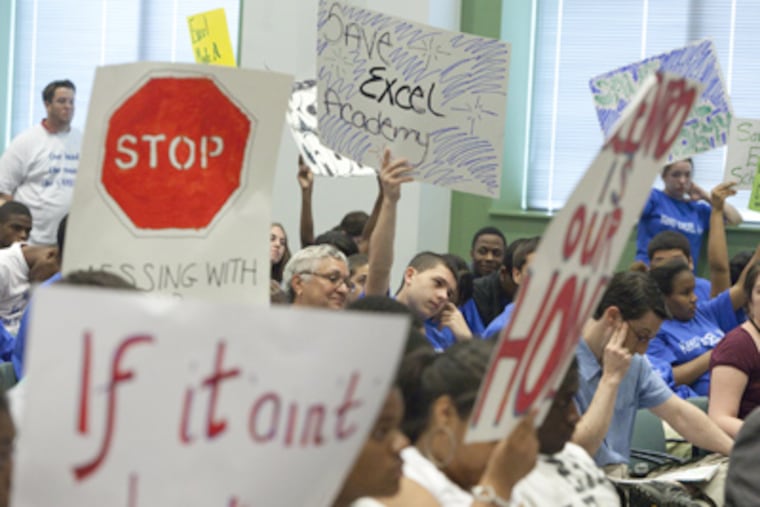SRC seeks more from PFT, votes to reopen contracts
THE SCHOOL DISTRICT of Philadelphia has thrown down the gauntlet and declared war. In a move that will no doubt garner much criticism and opposition in the coming days, the School Reform Commission voted last night to reopen union contracts to ask for more concessions.

THE SCHOOL DISTRICT of Philadelphia has thrown down the gauntlet and declared war.
In a move that will no doubt garner much criticism and opposition in the coming days, the School Reform Commission voted last night to reopen union contracts to ask for more concessions.
Unions have until June 30 to make concessions "necessary to achieve the needed economies," otherwise Superintendent Arlene Ackerman can recommend chucking contracts altogether.
Union officials and education activists say the district will stop at nothing to plug the massive $629 million hole they say was created by excessive spending, and are also disturbed that the SRC approved the district's proposed $2.7 billion budget that contains harsh cuts to early-childhood education and teaching positions.
Jerry Jordan, president of the Philadelphia Federation of Teachers, the district's largest union, said he's never witnessed such a breach of contract and will do whatever it takes to force the district to keep its end of the bargain.
"It's absolutely unreasonable, it's dishonest and it certainly is something that they should hide their heads in shame," he said outside the meeting at school-district headquarters.
The resolution, passed unanimously by the commission, "authorizes" and "directs" the school district to renegotiate "in good faith" existing collective-bargaining agreements.
District officials have made the proposal as part of their gap-closing plan, which also calls for layoffs and cuts to full-day kindergarten, and estimate saving $75 million in contract renegotiations.
If imposed, conditions protected in contracts - for instance, vacation and sick time, seniority and other benefits - are susceptible to elimination.
Jordan said those he represents, including teachers and counselors, have already given enough.
Robert McGrogan, president of the Commonwealth Association of School Administrators, who represents principals and assistant principals, said that although he prefers that his members' contract remain intact, he's willing to sit down with district officials.
"It's in our best interest to see if and where there are areas where things can be done more efficiently," he said. "It's a dire time, economically speaking. I can't cross my arms and say we're not listening."
Meanwhile, the district and the SRC beat the deadline to pass a budget for the 2011-12 fiscal year. Commissioner Johnny Irizarry, the only no vote on the budget issue, said he was uneasy over too many unanswered questions.
"It's painful, it's painful," he said after the meeting. "I understand the cuts that need to be made and I support that, but I didn't believe in some of the cuts. I couldn't consciously do it."
Fellow board member Joseph Dworetzky was also reluctant but voted in favor of the measure.
"It's not a happy vote," he said before casting his vote. "I wish it could be much different, but I think the approach that's been taken is a fair approach. I'm very very hopeful that this is not where we will end up."
When the budget measure passed, audible moans and mumbles rippled through the crowded room.
From politicians to parents, many balked at the SRC's decision.
City Councilman Bill Green, who told district officials to treat city and state partners "like adults," said the district needs to be held accountable.
"What they need to do is pass a budget that contains the things that we know work . . . and then come and prove to us that the programs that they currently have in their budget . . . like some of the Imagine 2014 programs . . . are worth investing in and then we can come up with additional dollars for that."